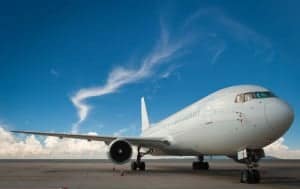As More States Make Recreational Marijuana Legal, Flying Between States with the Drug Gets Tricky

That means marijuana users can take their prescriptions or legally-purchased recreational hash on an airplane, right?
Technically, no, but the laws are becoming trickier as more states pass some form of legalized marijuana. Marijuana is still a “Schedule 1” substance under federal law, which means that at the federal level, marijuana users can still face drug charges for using the substance, even if they are over the age of 21 and obtained the drug legally in a recreational state, or if they have a legal medical prescription. While the Department of Justice stated in 2014 that they would not prosecute those who used the drug legally according to their state’s law, crossing state lines with marijuana breaks federal law – even if the user travels from one legal marijuana state to another.
Most airports fall under federal jurisdiction, which means that, technically, marijuana users may not have their drugs with them at the airport, not even in their checked luggage. Airports in Washington state and Colorado do not allow anyone to have marijuana in the airport for any reason, even though both states legalized recreational marijuana use years ago. Until the United States government changes the laws on marijuana, it is a federal crime to transport the drug across state lines. It is also a federal crime to take marijuana out of the country.
However, the Transportation Security Agency (TSA), notorious for making travelers’ lives difficult with lengthy pre-boarding security screenings, actually does not search travelers specifically for drugs, including marijuana. Per their website, their current marijuana policy states:
“TSA security officers do not search for marijuana or other drugs. In the event a substance that appears to be marijuana is observed during security screening, TSA will refer the matter to a law enforcement officer.
“Whether or not marijuana is considered legal under local law is not relevant to TSA screening because TSA is governed by federal law. Federal law provides no basis to treat medical marijuana any differently than non-medical marijuana.
“Even if an item is generally permitted, it may be subject to additional screening or not allowed through the checkpoint if it triggers an alarm during the screening process, appears to have been tampered with, or poses other security concerns. The final decision rests with TSA on whether to allow any items on the plane.”
So the TSA follows federal guidelines, but will refer the matter to local law enforcement, who follow state regulations.
Per this statement, some marijuana paraphernalia will not be allowed through either. If a device is specifically designed for marijuana use, or has clear marijuana residue on it, then it will be confiscated and the owner could face federal drug charges. However, items that could be for either marijuana or tobacco products can technically make it through security.
If an airport has a smoking section, a marijuana user may not smoke pot in that area. However, general airport guidelines suggest that other types of marijuana, such as marijuana edibles, can be consumed “out of public view” – and if the user is caught by law enforcement, that statement remains open to interpretation.
While a marijuana user may have consumed marijuana legally before arriving at the airport, federal guidelines state that the drug may not be transported across state lines, even if both states have legalized marijuana use. Arriving in a state like Colorado specifically to consume marijuana as a tourist activity will not land the user in federal prison, but the drug may not leave the state.

